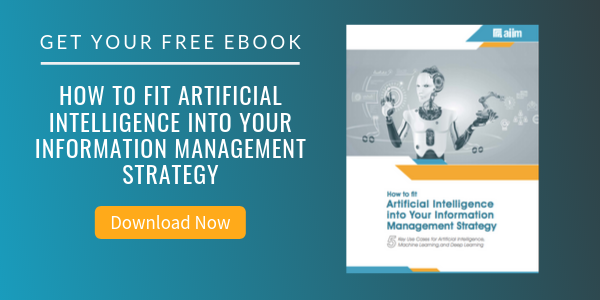
How to Make Machine Learning and AI Accessible and Useful
Machine Learning | Artificial Intelligence (AI)
These days it feels almost impossible to have a conversation with anyone involved in the world of Information Management without bringing up machine learning and artificial intelligence. Everyone is talking about it; everyone has an opinion; everyone claims to be doing it— or at least thinking about doing it. AI is part of the popular zeitgeist, entering our lives in the form of autonomous vehicles on our roads, Alexa in our homes, and a burgeoning AI arms race between rival world powers. Yet despite all the talk, no one really seems to agree on what its real impact will be. In fact, everyone seems to have a different definition of what ‘it’ even is. There are those telling us it’s nothing new, and its potential is over-hyped, while others tell us that AI and Machine Learning will make us all redundant.
I recently asked a number of people if they would consider using machine learning tools for their Information Management needs; all of them said yes. But when asked how they would use them, and how they would choose between an array of different machine learning tools, they came up with a blank. In fact, nobody seemed to really understand what differentiated one machine learning or artificial intelligence tool from another. If AI is set to play a major role in our work, then we are leaving ourselves open for expensive mistakes to be made.
This past year we worked with AIIM to develop a training course that provides fundamental teaching on how machine learning and AI actually work — the different methods used, the limitations of each approach, and some key guidance on how to steer your way through the burgeoning AI landscape. What we learned in the process of creating the training is that a little knowledge can go a very long way. You don’t need to be a math or data science genius to understand AI. Building a machine learning or AI tool is quite a different thing to selecting the right tool to use and putting that tool to use in your organization.
We have no doubt that AI will play a major role in the world of IT in the future. But while some people are already using it, many more are feeling frustrated. Over the past year, we have come to understand those frustrations and found a middle ground to share the essentials with anyone that has an interest.
The good news is that although AI, Machine Learning, and Deep Learning are structurally complex, the principles are not too hard to grasp. Anyone that wants to can grasp the principles and apply them effectively.
Today’s AI discussions are driven by data scientists, but we don’t need or want a future driven by data scientists. Instead, the future must be driven by informed and smart business professionals who understand the specific needs of their organization. As Amazon’s CEO Jeff Bezos recently pointed out, "..the thing I have noticed is that when the anecdotes and the data disagree, the anecdotes are usually right. There's something wrong in the way you're measuring." Regardless of how impressive AI and Machine Learning are, they need informed help, guidance, and insights from the real world to be truly effective.
At the end of the day, AI and Machine Learning systems are tools, just like any other technologies, and they need skilled people to extract real value from them.
About Alan Pelz-Sharpe
Extensive experience in information & process management working with businesses and IT executives to analyse and define needs and priorities. Also advising technology vendors large and small to understand specific buyer patterns and goto market requirements. Over the years my clients have included FedEx, The Mayo Clinic, AstraZeneca, Shell & BP and public organisations including the Federal Reserve Board, Global Intelligence Agencies, State and National Governments.



